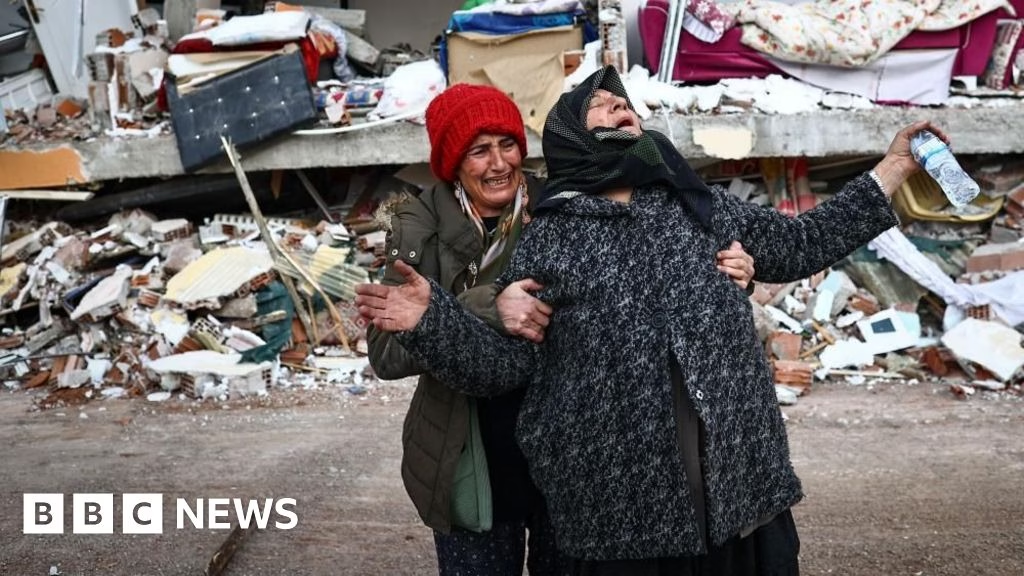Google has acknowledged that its earthquake early warning system did not accurately alert individuals during Turkey’s deadly earthquake in 2023.
Up to ten million people within a 98-mile radius of the earthquake’s epicenter could have received Google’s highest level alert, granting them up to 35 seconds to seek safety.
However, the system only issued 469 “Take Action” warnings for the first earthquake, measuring 7.8 in magnitude.
Google informed the BBC that half a million individuals received a lower-level warning, designed for “light shaking,” which does not notify users as prominently.
Previously, Google claimed the system had “performed well.”
The system is functional on Android devices, which account for over 70% of the phones in Turkey.
On February 6, 2023, more than 55,000 people lost their lives and over 100,000 were injured when two major earthquakes struck Southeast Turkey. Many victims were asleep when buildings collapsed around them.
Google’s early warning system was active during the earthquakes, but it underestimated their intensity.
“We continue to enhance the system based on our learnings from each earthquake,” stated a Google spokesperson.
Google’s earthquake warning system, known as Android Earthquake Alerts (AEA), utilizes a vast network of Android operating system-based mobile phones to detect shaking.
Since earthquakes travel relatively slowly through the Earth, a warning can be issued.
The most severe warning from Google is called “Take Action,” which triggers a loud alarm on the user’s phone, breaking through the Do Not Disturb setting and covering the screen.
This alert is intended to be sent when stronger shaking is detected, posing a threat to human life.
AEA also features a less severe “Be Aware” warning, which informs users of potential lighter shaking without overriding a device’s Do Not Disturb setting.
The “Take Action” alert was crucial in Turkey due to the catastrophic shaking and the timing of the first earthquake, occurring at 04:17 when many users would have been asleep.
Months after the earthquake, the BBC aimed to speak to users who had received this warning to demonstrate the effectiveness of the technology.
However, despite conducting interviews in towns and cities affected by the earthquake over several months, the BBC was unable to find anyone who had received a more serious “Take Action” notification before the quake struck. The findings were published later that year.
Google researchers have published an account of the system’s shortcomings in the Science journal, attributing the issues to “limitations of the detection algorithms.”
For the initial earthquake, the system estimated the shaking to be between 4.5 and 4.9 on the moment magnitude scale (MMS), when it was actually a 7.8.
A second significant earthquake later that day was also underestimated, with the system issuing Take Action alerts to 8,158 phones and Be Aware alerts to nearly 4 million users.
Following the earthquake, Google’s researchers updated the algorithm and re-simulated the first earthquake.
This time, the system generated 10 million Take Action alerts for those most at risk and an additional 67 million Be Aware alerts for those living further from the epicenter.
“Every earthquake early warning system faces the same challenge, fine-tuning algorithms for large magnitude events,” Google stated to the BBC.
Elizabeth Reddy, an Assistant Professor at the Colorado School of Mines, expressed concern that it took over two years to release this information.
“I’m really frustrated that it took so long,” she said.
“We’re discussing a significant event where people lost their lives, and the warning didn’t perform as we would have liked.”
Google asserts that the system is meant to complement national systems, not replace them.
However, some scientists worry that countries are excessively reliant on untested technology.
“Being transparent about how well the system works is absolutely critical,” Harold Tobin, Director of the Pacific Northwest Seismic Network, told the BBC.
“Could some places assume that Google is handling it, so we don’t have to?”
Google researchers argue that post-event analysis has improved the system, and AEA has issued alerts in 98 countries.
The BBC has requested information on AEA’s performance during the 2025 earthquake in Myanmar from Google but has not yet received a response.








